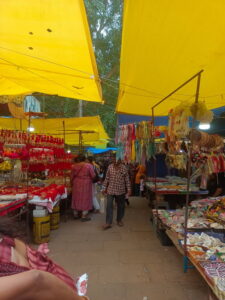By Ritwika Chatopadyay, AIDMI, India

Introduction
The Ahmedabad heatwaves saw a far-reaching impact on the citizens, but none as much as it had on the street vendors who brave the scorching sun every day. Such harsh weather brings plummeting sales, serious health risks and extremely precarious working conditions to these informal businessmen who are part of the very fabric of the economy of the city. Their plight badly goes unheard. Inadequate support does not only put their health at risk but also their livelihood, as continuous heatwave cause both physical strain and financial losses. Realising the need for understanding their struggles during the heatwaves, AIDMI arranges for a documentation study on their challenges and responses with an aim of decisive action and interventions to ensure their well-being, safety and continued contribution to the city’s economy.
The heatwave impacts people in general, with the most affected being the street vendors who are exposed to the scorching sun all day long. The impact on the informal economy is often unheard, despite the urgent support needed by these businessmen. Most of the informal businessmen in Ahmedabad do not have proper cooling systems or shade; hence, it is even tougher for them to face such extreme heat. A lack of such basic facilities exaggerates their issues during a heatwave. It becomes a struggle for those businessmen to keep their business going and maintain health and well-being. Their struggles require urgent attention and support with proper government initiatives and guidance for their well-being. A documentation study was conducted with the view that understanding their experiences can help in implementing effective relief measures to support these individuals in need. In this regard, 101 testimonials were collected from different marketplaces in the city of Ahmedabad, studying the challenges in the lives of informal businessmen amidst heatwaves. Though they are facing plummeting sales due to declining customer foot traffic, they continue being exposed to the scorching sun rays and oppressive heat with their stall, working longer hours than usual with a hope in their eyes to have a moderate sale to cover their basic expenses with the little they earn. Their situation further gets worsened by the product spoilage, supply issue, inflation and health related problems. Many of these people couldn’t afford even a makeshift for shade and liquids other than water required to keep them hydrated. Many women reported to have complications with their menstrual cycles, while others also included being irritable, uneasy, having headaches, heart palpitations, indigestion, loss of appetite and other health problems. The municipal authorities further limit the businessmen from many of the market-places from peacefully operating their businesses at times, which add to their stress and challenges even more.
What can be done for them?
Many steps can be taken to lessen the sufferings of the street vendors in their business locations and at home, during these heat wave conditions. During the survey, many of them suggested providing arrangements for shading, drinking water facilities in the market, properly designated vending zones, arrangements for loans and immediate medical support in the market. Moreover, the NDMA can declare “Heatwave” as a disaster to help fund the distressed and marginalised community. This will provide much-needed relief and support to the people more seriously affected by the extreme heat. Another solution that could be worked out includes provision for Cooling Carts by Trane Technologies under the UN Sustainable Development Goals 2030 (SDG 2030) for the street vendors. These carts could offer some shade and a cool place for the vendors to relax and rehydrate. During the extreme heat periods, creating some cooling shelters or a rest area for the vendors in the market further helps in protecting them from such hazards of heat. This can be further supported by collaboration with any local businesses or organisations to distribute relief supplies like umbrellas, water and electrolyte drinks for free to the people in need. Further innovative solutions such as electricity-free refrigerators made of baked clay by Mitticool will also assist vendors to store unsold vegetables for a few days without spending a single penny.
Keeping their houses cool can be done through various technologies and mechanisms. The use of Modroofs that are made of waste cardboards and natural fibers can help in cooling and they are easy to install and dismantle. Growing potted plants, creepers or trees on and over the roofs can also lower the indoor temperature. Painting the roofs white or painting the roofs and walls that are exposed to sunlight and heat with reflective paint can decrease the heat load. During a new construction of a building, consideration of the building orientation and cross ventilation is important. They can also use Air-lite ventilation and materials like Compressed Stabilised Earth Blocks and Mud & Lime mortar instead of cement, as it can also help majorly in cooling the indoor spaces. These materials are eco-friendly, easily available and cost-effective. Geothermal Installation using underground pipes in some cases can also be an option to keep their houses cool. Implementing heatwaves preparedness training programmes, and awareness programmes for informal businessmen for both the heatwave adaptation lessons and also making them aware of the available facilities under the Ahmedabad Heat Action Plan is important.